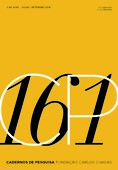Injustice, conflict and violence: a case study in public school in Recife
Keywords:
Schools, Violence, Conflict, JusticeAbstract
The article presents partial results of a study based on a case study in a statepublic school in Recife (PE). The data show that the school actors refer to a sense of injustice, relating it to a decrease in well-being, which may generate conflicts and violence in the school setting. High school students, teachers and administrators were informally interviewed in the intervals between classes. This was done in order to conduct this activity in its natural setting, as well as to avoid violating ethical principles of research. Teachers and the headmistress were also interviewed using a semi-structured instrument. The study concludes that justice in the school context should be viewed from its multidimensional nature and ambiguity, limiting the ability to intervene, thus often leading school actors to justify unfair practices.
Downloads
References
ABRAMOVAY, Miriam; RUA, Maria das Graças. Violências nas escolas. Brasília: Unesco, 2002.
ARENDT, Hannah. Da violência. Tradução de Maria Cláudia Drummond Trindade. Brasília: Editora Universidade de Brasília, 2004.
BARDIN, Laurence. Análise do conteúdo. Lisboa: Edições 70, 1979.
BOTLER, Alice Miriam Happ. A escola como organização comunicativa. 2004. 299 f. Tese (Doutorado) – Universidade Federal de Pernambuco, Recife, 2004.
BRASIL. Instituto Nacional de Estudos e Pesquisas Educacionais Anísio Teixeira – Inep. Ideb. 2012. Disponível em: <http://portal.inep.gov.br/web/portal-ideb>.
BRASIL. Presidência da República. Lei n. 12.288, de 20 de julho de 2010. Institui o Estatuto da Igualdade Racial; altera as Leis n. 7.716, de 5 de janeiro de 1989, n. 9.029, de 13 de abril de 1995, n. 7.347, de 24 de julho de 1985, e n. 10.778, de 24 de novembro de 2003. Brasília, 2010.
CORDEIRO, Juliana Nunes; BOTLER, Alice Miriam Happ. Concepções e vivências de alunos de 5º ano a respeito da gestão democrática e da justiça em escolas de maior e menor IDEB. In: ENCONTRO DE PESQUISA EDUCACIONAL DO NORTE E NORDESTE – EPENN, 21., 2013, Recife.
Anais... Recife: Anped, 2013.
DEROUET, Jean-Louis. A sociologia das desigualdades em educação posta à prova pela segunda explosão escolar: deslocamento dos questionamentos e reinício da crítica. Revista Brasileira de Educação, Rio de Janeiro, n. 21, p. 5-16, set./dez. 2002.
ESTEVÃO, Carlos Alberto Vilar. Justiça e educação. São Paulo: Cortez, 2001.
ESTEVÃO, Carlos Alberto Vilar. Educação, justiça e democracia. São Paulo: Cortez, 2004.
ESTEVÃO, Carlos Alberto Vilar. Educação, justiça e direitos humanos. Educação e Pesquisa, São Paulo, v. 32, n. 1, p. 85-101, jan./abr. 2006.
FRASER, Nancy. Sobre justiça: lições de Platão, Rawls e Ishiguro. Revista Brasileira de Ciência Política, Brasília, n. 15, p. 265-277, set./dez. 2014.
GALVÃO, Afonso et al. Violências escolares: implicações para a gestão e o currículo. Ensaio: Avaliação de Políticas Públicas Educacionais, Rio de Janeiro, v. 18, n. 68, p. 425-442, jul./set. 2010.
LOPES, Claudivan Sanches; GASPARIN, João Luiz. Violência e conflitos na escola: desafios à prática docente. Acta Scientiarum, Human and Social Sciences, Maringá, v. 25, n. 2, p. 295-304, 2003.
MAINARDES, Jefferson; MARCONDES, Maria Inês. Entrevista com Stephen Ball: um diálogo sobre justiça social, pesquisa e política educacional. Educação e Sociedade, Campinas, v. 30, n. 106, p. 303-318, jan./abr. 2009. Disponível em: <http://www.cedes.unicamp.br>.
NOGUEIRA, Eliete Jussara; SOARES, Maria Lúcia de Amorim. Desafios educacionais na modernidade líquida: cotidiano, medo e indisciplina. Revista Educação e Cultura Contemporânea, v. 12, n. 27, p. 153-174, 2015.
OUTHWAITE, William; BOTTOMORE, Tom. Dicionário do pensamento social do século XX. Rio de Janeiro: Jorge Zahar, 1996.
RAWLS, John. Justiça como eqüidade: uma concepção política, não metafisica. Lua Nova, São Paulo, n. 25, p. 25-29, 1992.
Downloads
Published
How to Cite
Issue
Section
License
Copyright (c) 2016 Cadernos de Pesquisa

This work is licensed under a Creative Commons Attribution-NonCommercial 4.0 International License.
Authors who publish in this journal agree to the following terms:
a. Authors retain the copyright and grant the journal the right to first publication, with the paper simultaneously licensed under the Creative Commons Attribution license that allows the sharing of the paper with acknowledgment of authorship and initial publication in this journal.
b. Authors are authorized to assume additional contracts separately, for non-exclusive distribution of the version of the paper published in this journal (for example publishing in institutional repository or as a book chapter), with acknowledgment of authorship and initial publication in this journal.
c. Authors are allowed and encouraged to publish and distribute their paper on-line (for example in institutional repositories or on their personal page) at any moment before or during the editorial process, as this can generate productive changes, as well as increase the impact and citation of the published paper (See The Effect of Open Access).









